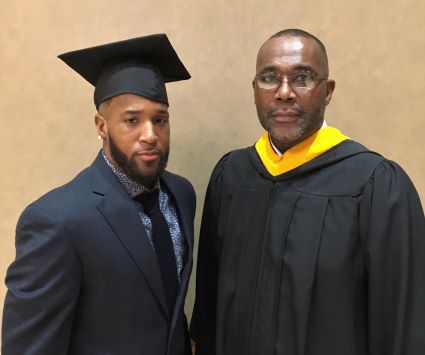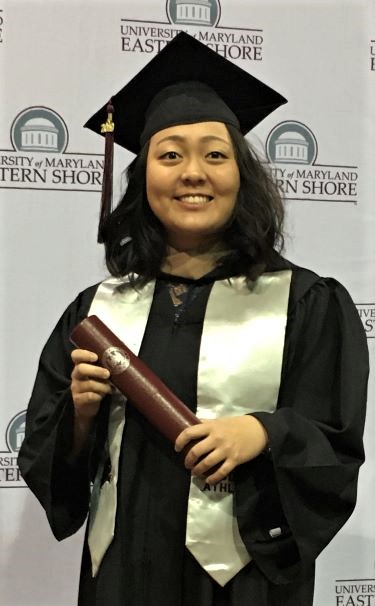
University awards 272 degrees on Friday the 13th
Friday, December 13, 2019
Paraskevidekatriaphobia – fear of Friday the 13th – was nowhere to be found today inside the William P. Hytche Athletic Center, the venue for the University of Maryland Eastern Shore’s 23rd winter commencement exercises.
UMES awarded degrees in the semi-annual rite of passage to 272 people, who officially became alumni. Family, friends and fellow students showered graduates with cheers of joy and approval that neutralized any hint of superstition caused by a harmless number on the calendar.
Gbemisola Okesanjo, a marketing major from Chicago, successfully auditioned for the honor of delivering the student commentary on behalf of the Class of 2019.
Okesanjo, who starts work soon with JP Morgan Chase, reminded classmates their “experiences here have given us thick skin to combat anything that seems to get in the way of our dreams. We’ve grown powerful because we have learned to be unapologetically ourselves.”
“I challenge you to reach back and create opportunity for those who will come after you. It will be our duty to use our superpowers to transform our beloved institution and our communities,” she said.
“There is value in community, so be intentional … how you choose to uplift your communities with this newfound superpower,” she said. “Be transparent within your communities so they may follow your path to greatness.”
For Tayron Sisco of Still Pond, Md., graduation day was an opportunity to pay tribute to his father in a unique way.

Sisco, who came to UMES after earning an associate’s degree from Chesapeake College in Wye Mills, Md., successfully lobbied the UMES administration to allow his father, Troy, the honor of crossing the stage in his place.
Those in the audience heard Tayron’s name announced, but it was Troy Sisco, a 38-year veteran of the State Highway Administration, who cautiously but confidently strode across the stage, shaking President Heidi M. Anderson’s hand and accepting his son’s hospitality-tourism management / general education degree.
“My father never had the opportunity or chance to go to college,” Tayron Sisco said. “Instead, he worked really hard to provide for his family.”
“I tried to talk him out of it,” said the elder Sisco, who as a young man decided supporting his young family came before studying to be a minister.
“I was really proud of him for even thinking of something this special,” Troy Sisco said. “I’m grateful to have such an unselfish son.”
A beaming Tayron sat in the bleachers with other family members and invited guests. “I did this to send a broader message that it’s important to remember the sacrifices people are willing to make so you can be successful,” he said.
Ryan Bohner is a role model for those who wonder if it’s too late to pursue a college degree.
After graduating a decade ago from high school in Chandler, Arizona, he enrolled in flight school – but after several years found it to be an expensive endeavor.
Bohner instead enlisted in the U.S. Navy and became a ground-based flight engineer assigned to anti-submarine surveillance aircraft. He signed up for a six-year tour because the incentive after discharge was the G.I. Bill, which would pay for his goal to be a pilot.
While stationed in Norfolk and about to be discharged, he found UMES’ aviation sciences program online and made an instant connection with our faculty.
Bohner earned his private and commercial pilot licenses as well as his instrument rating credential.
“The aviation program here is great,” he said. “You can learn to fly, and there’s just so much great information about the profession you’re exposed to.”
“I would recommend it to anybody,” he said.
Classmates and faculty agree Mariah Terry of Clinton, Md. blossomed into a multi-talented artist as an applied design student who mastered graphic design, traditional and digital drawings, comic-book character storytelling and painting.
Her impressive oil portrait of Harriett Tubman was selected to hang for the next year in a prominent location at the Underground Railroad Visitors Center near Cambridge named in honor of the revered abolitionist.
A successful summer internship with Universal Phoenix Group in Atlanta, paid off for Terry. The dean’s list student has a job offer from the graphic design company, where she anticipates working on developing products such as coloring books and comic books.
Kurtis Rogers from Rising Sun, Md. received his degree in exercise science after enrolling 18 months ago as a transfer student from a private institution in Tennessee.
Rogers used what he was learning in UMES kinesiology classes by working as a wellness assistant at a local YMCA and did an internship under the tutelage of Dr. Tanya Dixon, a graduate of UMES’ physical therapy program.
He called working for Dixon an “amazing experience” that made him feel “a lot more confident” in his abilities while also helping him develop communication skills.
Rogers will return to UMES in August as graduate student in physical therapy after securing one of about 30 seats in for the next class in the graduate program.
While waiting to start graduate school, Rogers will return to Cecil County to work as physical therapy technician to give himself more hands-on experience.
Bernice Bediako of Ghana received her doctorate in toxicology, her fourth college degree. She holds master’s degrees in chemistry from the University of Maryland Baltimore County and in marine-estuarine-environmental sciences from UMES.
Her dissertation defense a month ago attracted a near capacity audience to Carver Hall. Her faculty mentor described Bediako as “intelligent, dedicated, well-rounded, and organized” student who harbors “a desire to learn and make a difference.”
Her research focused on bisphenol A, a compound found in polycarbonate plastics and epoxy resins in commonly used packaging like bottles and food containers. Scientists are increasingly suspicious BPA could be a culprit in the onset of neuro-degenerative diseases like Parkinson’s.
Bediako’s research, which she plans to continue, concluded that the chemical indeed alters the body’s endocrine system in ways that point to “neuronal dysfunction.” Those judging her presentation were convinced her research and report were worthy of being awarded a doctorate.

